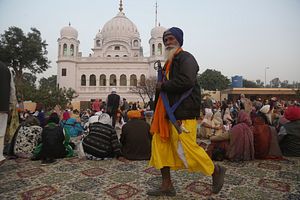In speeches made at the inaugural ceremony of the opening of the Kartarpur Corridor on the Pakistani side, on November 9, both the Pakistan Prime Minister Imran Khan and Foreign Minister Shah Mehmood Qureshi raised the Kashmir issue (with the latter being more aggressive). The Pakistani prime minister also spoke about the need for economic ties between India and Pakistan, and also reiterated the need for both countries to jointly fight the scourge of poverty.
One of the important points raised at the inauguration ceremony was the need to enhance trade links between India and Pakistan in general, and the two Punjabs in particular. Navjot Singh Sidhu, a close friend of Imran Khan, who is credited by many (especially in Indian Punjab, and large sections of the Sikh diaspora) for giving a fillip to the opening of the corridor, during his speech, urged the Pakistani prime minister to liberalize trade and make the India-Pakistan border more porous.
Sidhu, a former minister in the Punjab government in India,and a legislator from the border town of Amritsar, also made an interesting point that the corridor had healed the wounds of 1947 to a large extent. Sidhu, while pitching for closer economic ties and more porous borders, stated that this would not just help the bilateral relationship, but also provide landlocked East Punjab access to Afghanistan, Iran, and Central Asia. For instance, one of the reasons why India had gone ahead with the Chabahar Project in Iran is Islamabad’s refusal to grant India land access to Afghanistan and Central Asia.
With Iran-U.S. tensions rising, and New Delhi being cautious over the Chabahar Project, Islamabad providing access could be an important step. In the short run, however, this is unlikely.
Past Efforts
In the past, attempts have been made by numerous governments to enhance both people to people linkages as well as economic ties not just between the Punjabs, but other border provinces as well, but politics has acted as an impediment. Some of the important initiatives taken by former Indian Prime Minister Manmohan Singh’s government in 2005-2007 included rail services connecting Munabao (Rajasthan) and Khokhrapar (Sindh), a bus service connecting Amritsar (Punjab, India) with the holy city of Nankana Sahib (Punjab, Pakistan), the birth place of Guru Nanak.
Between 2011 to 2014, steps were taken to normalize the economic relationship between India and Pakistan. The setting up of an Integrated Check Post at Attari (the Indian side of the Wagah-Attari land crossing) was an important step in this direction, and, for a while, there was an incremental rise in trade between both countries. Since 2016, after the Uri terror attacks, in which 18 Indian soldiers were killed, the bilateral relationship has consistently gone down hill and people-to-people ties as well as economic links have been an important casualty.
The decision to go ahead with the Kartarpur Corridor in 2018 also raised hopes of closer trade linkages, but the Pulwama terror attack in February 2019, ensuing tensions, and the suspension of trade and people-to-people ties by Pakistan after the revocation of Article 370 dashed all such hopes.
While it is important to be realistic and understand the fact that apart from the corridor both countries have no engagement, in the past, Punjab-Punjab linkages have gone ahead when relations between New Delhi and Islamabad have been manageable (whether it was the phase from 2004-2007 or 2011 to 2013). Business lobbies, as well as the state government of Punjab, could play a positive role in reviving economic ties. In the past too, state governments have played an important role. Interestingly, Captain Amarinder Singh of Punjab, who had expressed apprehensions with regard to the corridor being a Pakistani intelligence conspiracy, after his return from Kartarpur, spoke in favor of greater people-to-people contacts between both Punjabs. Singh’s views were echoed by political leaders across the board.
Harinder Singh, a U.S.-based Sikh scholar and activist, in a tweet pertaining to the Kartarpur Corridor, made the point that this initiative through both Punjabs could pave the way for “reconciliation” in South Asia. One of South Asia’s foremost strategic commentators, C. Raja Mohan, in an article for The Indian Express, alluded to the possibility of Punjab playing an important role in reducing tensions between both countries. He also made an interesting argument that apart from the governments, the Punjabi diaspora could play an important role in getting both Punjabs closer. In the past, civil society groups and intellectuals in the diaspora have played a pro-active role in pitching for peace between East and West Punjab. The Pakistani government has been reaching out to the Sikh diaspora to invest in infrastructure projects linked to important Sikh shrines. Some members of the diaspora have already committed to investing in renovation of Sikh shrines.
Today, Guru Nanak’s message of compassion is relevant in the context of South Asia in general, and the two Punjabs in particular. The opening of the Kartarpur Corridor would hopefully play a role not just in fulfilling the desire of Sikh pilgrims to pay obeisance at the holy city of Kartarpur, but also pave the way for reduced tensions between New Delhi and Islamabad. The biggest beneficiary of any thaw between India and Pakistan would be not just West Punjab, but also East Punjab, which has been left behind economically in recent decades due to a plethora of reasons. Trade with Pakistan and access to markets in Afghanistan and Central Asia will provide the much needed booster to the state’s sagging economy.
Tridivesh Singh Maini is a New Delhi based Strategic Analyst associated with The Jindal School of International Affairs, OP Jindal Global University.

































